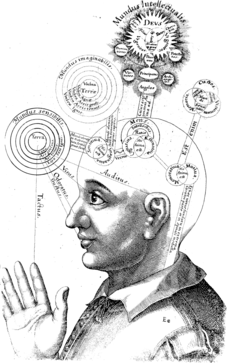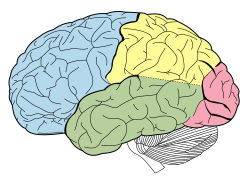Cognitive evaluation theory (CET) is a theory in psychology that is designed to explain the effects of external consequences on internal motivation. Specifically...
14 KB (1,913 words) - 22:49, 7 January 2025
six mini-theories. The main five mini-theories are cognitive evaluation theory, organismic integration theory, causality orientations theory, basic needs...
88 KB (11,193 words) - 18:15, 28 January 2025
Modern Group That Predicted the Destruction of the World (1956) and A Theory of Cognitive Dissonance (1957), Leon Festinger proposed that human beings strive...
129 KB (15,614 words) - 20:46, 24 April 2025
Social cognitive theory (SCT), used in psychology, education, and communication, holds that portions of an individual's knowledge acquisition can be directly...
57 KB (7,075 words) - 16:06, 23 February 2025
Overjustification effect (category Cognitive biases)
developed the cognitive evaluation theory to explain the results. As a sub-theory of self-determination theory, cognitive evaluation theory explains that...
26 KB (3,319 words) - 04:38, 13 May 2024
Piaget's theory of cognitive development, or his genetic epistemology, is a comprehensive theory about the nature and development of human intelligence...
88 KB (10,537 words) - 12:16, 9 May 2025
types of cognitive load has been investigated and questioned. Now it is believed that they circularly influence each other. Cognitive load theory was developed...
49 KB (5,789 words) - 18:34, 3 April 2025
why crowding out occurs. On this view—sometimes referred to as cognitive evaluation theory—the post-behavioral significance people assign to the reward...
30 KB (3,844 words) - 22:47, 7 January 2025
investigates factors affecting theory of mind in humans, such as whether drug and alcohol consumption, language development, cognitive delays, age, and culture...
136 KB (17,082 words) - 03:55, 9 May 2025
culturally-based knowledge and practice. Sociocultural theory extends the social aspects of Cognitive Evaluation Theory, which espouses the important role of positive...
108 KB (14,244 words) - 18:48, 1 June 2024
a 1984 publication by Richard Lazarus and Susan Folkman. In this theory, cognitive appraisal is defined as the way in which an individual responds to...
22 KB (2,573 words) - 11:12, 13 May 2025
seventeenth century Central European Time, UTC+1:00 Cognitive evaluation theory, a psychological theory explaining environment's effects on motivation Colombo...
2 KB (267 words) - 22:57, 4 June 2024
Appraisal theory is the theory in psychology that emotions are extracted from our evaluations (appraisals or estimates) of events that cause specific...
41 KB (5,778 words) - 18:19, 7 April 2024
Emotion (redirect from Cognitive theory of emotion)
Appraisal-Tendency Theory include: Cognitive Appraisals: Appraisal tendencies refer to the habitual or characteristic ways that individuals appraise or evaluate situations...
138 KB (16,263 words) - 22:26, 14 May 2025
that individuals drive to gain accurate self-evaluations. The theory explains how individuals evaluate their opinions and abilities by comparing themselves...
47 KB (6,173 words) - 02:40, 15 May 2025
users to accomplish tasks with the system. A cognitive walkthrough is task-specific, whereas heuristic evaluation takes a holistic view to catch problems not...
13 KB (1,752 words) - 11:51, 7 June 2024
Cognition (redirect from Cognitive process)
judgment and evaluation, reasoning and computation, problem-solving and decision-making, comprehension and production of language. Cognitive processes use...
51 KB (5,988 words) - 01:27, 16 April 2025
Education sciences (redirect from Theory of education)
instructional theory, curriculum theory and psychology, philosophy, sociology, economics, and history of education. Related are learning theory or cognitive science...
27 KB (4,286 words) - 10:44, 14 May 2025
process theories can be found in social, personality, cognitive, and clinical psychology. It has also been linked with economics via prospect theory and behavioral...
57 KB (7,233 words) - 23:54, 14 April 2025
larger group of cognitive behavioral therapies (CBT) and was first expounded by Beck in the 1960s. Cognitive therapy is based on the cognitive model, which...
27 KB (3,242 words) - 17:20, 3 May 2025
an individual from breaking the law or otherwise reoffending. Cognitive evaluation theory Grimshaw, Damian (2013). Minimum Wages, Pay Equity, and Comparative...
2 KB (214 words) - 01:03, 24 May 2024
Cognitive biases are systematic patterns of deviation from norm and/or rationality in judgment. They are often studied in psychology, sociology and behavioral...
109 KB (10,092 words) - 15:01, 10 May 2025
ignoring the unfavorable. The foundation of this theory is rooted in the cognitive dissonance theory (Festinger 1957), which asserts that when individuals...
52 KB (6,763 words) - 06:38, 12 April 2025
Cognitive linguistics is an interdisciplinary branch of linguistics, combining knowledge and research from cognitive science, cognitive psychology, neuropsychology...
30 KB (3,346 words) - 00:05, 12 March 2025
Executive functions (redirect from Cognitive control)
In cognitive science and neuropsychology, executive functions (collectively referred to as executive function and cognitive control) are a set of cognitive...
106 KB (12,129 words) - 10:27, 15 April 2025
suggested that these negative evaluations derive from the negative schemata and cognitive biases of the person. According to this theory, depressed people have...
166 KB (18,367 words) - 03:24, 12 May 2025
attitudes are cognitive schema that provide a structure to organize complex or ambiguous information, guiding particular evaluations or behaviors. More...
54 KB (6,323 words) - 09:53, 10 April 2025
of human cognitive abilities. This difference in defining and interpreting "intelligence" has fueled ongoing discussions about the theory's scientific...
70 KB (8,324 words) - 00:59, 11 May 2025
It was proposed by Aaron Beck in 1967. The triad forms part of his cognitive theory of depression and the concept is used as part of CBT, particularly...
31 KB (3,519 words) - 01:46, 22 November 2024
human mind often seeks to avoid spending cognitive effort. The cognitive miser theory is an umbrella theory of cognition that brings together previous...
34 KB (4,037 words) - 09:56, 14 February 2025








